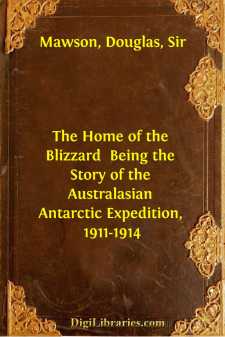Categories
- Antiques & Collectibles 13
- Architecture 36
- Art 48
- Bibles 22
- Biography & Autobiography 813
- Body, Mind & Spirit 142
- Business & Economics 28
- Children's Books 15
- Children's Fiction 12
- Computers 4
- Cooking 94
- Crafts & Hobbies 4
- Drama 346
- Education 46
- Family & Relationships 57
- Fiction 11828
- Games 19
- Gardening 17
- Health & Fitness 34
- History 1377
- House & Home 1
- Humor 147
- Juvenile Fiction 1873
- Juvenile Nonfiction 202
- Language Arts & Disciplines 88
- Law 16
- Literary Collections 686
- Literary Criticism 179
- Mathematics 13
- Medical 41
- Music 40
- Nature 179
- Non-Classifiable 1768
- Performing Arts 7
- Periodicals 1453
- Philosophy 64
- Photography 2
- Poetry 896
- Political Science 203
- Psychology 42
- Reference 154
- Religion 513
- Science 126
- Self-Help 84
- Social Science 81
- Sports & Recreation 34
- Study Aids 3
- Technology & Engineering 59
- Transportation 23
- Travel 463
- True Crime 29
The Home of the Blizzard Being the Story of the Australasian Antarctic Expedition, 1911-1914
by: Douglas Mawson
Categories:
Description:
Excerpt
INTRODUCTION
One of the oft-repeated questions for which I usually had a ready answer, at the conclusion of Sir Ernest Shackleton's Expedition (1907-09) was, "Would you like to go to the Antarctic again?" In the first flush of the welcome home and for many months, during which the keen edge of pleasure under civilized conditions had not entirely worn away, I was inclined to reply with a somewhat emphatic negative. But, once more a man in the world of men, lulled in the easy repose of routine, and performing the ordinary duties of a workaday world, old emotions awakened. The grand sweet days returned in irresistible glamour, faraway "voices" called:
...from the wilderness, the vast and Godlike spaces,
The stark and sullen solitudes that sentinel the Pole.
There always seemed to be something at the back of my mind, stored away for future contemplation, and it was an idea which largely matured during my first sojourn in the far South. At times, during the long hours of steady tramping across the trackless snow-fields, one's thoughts flow in a clear and limpid stream, the mind is unruffled and composed and the passion of a great venture springing suddenly before the imagination is sobered by the calmness of pure reason. Perchance this is true of certain moments, but they are rare and fleeting. It may have been in one such phase that I suddenly found myself eager for more than a glimpse of the great span of Antarctic coast lying nearest to Australia.
Professor T. W. E. David, Dr. F. A. Mackay and I, when seeking the South Magnetic Pole during the summer of 1908-09, had penetrated farthest into that region on land. The limiting outposts had been defined by other expeditions; at Cape Adare on the east and at Gaussberg on the west. Between them lay my "Land of Hope and Glory," of whose outline and glacial features the barest evidence had been furnished. There, bordering the Antarctic Circle, was a realm far from the well-sailed highways of many of the more recent Antarctic expeditions.
The idea of exploring this unknown coast took firm root in my mind while I was on a visit to Europe in February 1910. The prospects of an expedition operating to the west of Cape Adare were discussed with the late Captain R. F. Scott and I suggested that the activities of his expedition might be arranged to extend over the area in question. Finally he decided that his hands were already too full to make any definite proposition for a region so remote from his own objective.
Sir Ernest Shackleton was warmly enthusiastic when the scheme was laid before him, hoping for a time to identify himself with the undertaking. It was in some measure due to his initiative that I felt impelled eventually to undertake the organization and leadership of an expedition.
For many reasons, besides the fact that it was the country of my home and Alma Mater, I was desirous that the Expedition should be maintained by Australia. It seemed to me that here was an opportunity to prove that the young men of a young country could rise to those traditions which have made the history of British Polar exploration one of triumphant endeavour as well as of tragic sacrifice....


